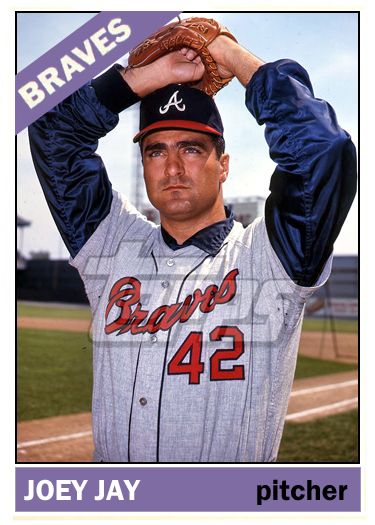rico43
<B>Director of Minor League Reports</B>
#42 JOEY JAY
Right-handed Pitcher
What came before: Lots of glory and success came Jay's way. An imposing right-hander (6-4, 230), he was also durable. In his second full pro season, he won 17 games with 18 complete games. But before that, he was one of the notorious 1953 bonus babies, who was required to spend two seasons in the majors with the Braves. He total workload those two seasons one complete-game shutout at age 17, 15 games at age 18 for a 2-0 record.

Allowed to assume a normal career from that point, he was bumped back to the minors until his beast of a 1957 season. He was up in the majors long enough to make one appearance for the World Champs.
Up for keeps in '58, he was 7-5, 2.14 in his “second” rookie season, and after a 9-8, 3.24 showing in 1960, the retooling Braves did the Reds a big favor and traded him to Cincinnati for light-hitting shortstop Roy McMillan. He was an all-star his first two seasons, leading the league with 21 wins his first season to lead the Reds to the World Series, then matching his win total a year later. But that same pitcher was an 18-game loser in 1963 due in part to an aching shoulder, beginning a decline that led his ill-fated return to the Braves.
That 1966 season: The lesson was harsh – you surely cannot go home again. Acquired from the Reds at the June 15 trade deadline for Hank Fischer, Jay merely found his final destination as a big leaguer. He brought with him a solid 6-2 record – including five straight wins – and 3.91 ERA in 10 starts. For the Braves, he had a save in his only relief appearance, but each of his eight starts was uglier than the one before. Final Braves numbers in 1966: 0-4, 7.89 with 26 earned runs allowed in 29.1 innings.
They gamely gave him starts right up to the end of the season, but released him in December.
What happened next: He signed a deal with the Phillies, made four minor league starts (3-1, 2.25) in 1967 but pitched more guile than velocity. He was soon released ror the last time.
He made a clean break from baseball, avoiding card shows and old timer's games. Instead, he became a West Virginia oilman, among other businesses. He lives in Florida most of the year, but has refused to allow his address to be publicized to anyone connected to baseball.
Right-handed Pitcher
What came before: Lots of glory and success came Jay's way. An imposing right-hander (6-4, 230), he was also durable. In his second full pro season, he won 17 games with 18 complete games. But before that, he was one of the notorious 1953 bonus babies, who was required to spend two seasons in the majors with the Braves. He total workload those two seasons one complete-game shutout at age 17, 15 games at age 18 for a 2-0 record.

Allowed to assume a normal career from that point, he was bumped back to the minors until his beast of a 1957 season. He was up in the majors long enough to make one appearance for the World Champs.
Up for keeps in '58, he was 7-5, 2.14 in his “second” rookie season, and after a 9-8, 3.24 showing in 1960, the retooling Braves did the Reds a big favor and traded him to Cincinnati for light-hitting shortstop Roy McMillan. He was an all-star his first two seasons, leading the league with 21 wins his first season to lead the Reds to the World Series, then matching his win total a year later. But that same pitcher was an 18-game loser in 1963 due in part to an aching shoulder, beginning a decline that led his ill-fated return to the Braves.
That 1966 season: The lesson was harsh – you surely cannot go home again. Acquired from the Reds at the June 15 trade deadline for Hank Fischer, Jay merely found his final destination as a big leaguer. He brought with him a solid 6-2 record – including five straight wins – and 3.91 ERA in 10 starts. For the Braves, he had a save in his only relief appearance, but each of his eight starts was uglier than the one before. Final Braves numbers in 1966: 0-4, 7.89 with 26 earned runs allowed in 29.1 innings.
They gamely gave him starts right up to the end of the season, but released him in December.
What happened next: He signed a deal with the Phillies, made four minor league starts (3-1, 2.25) in 1967 but pitched more guile than velocity. He was soon released ror the last time.
He made a clean break from baseball, avoiding card shows and old timer's games. Instead, he became a West Virginia oilman, among other businesses. He lives in Florida most of the year, but has refused to allow his address to be publicized to anyone connected to baseball.
